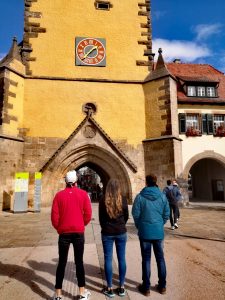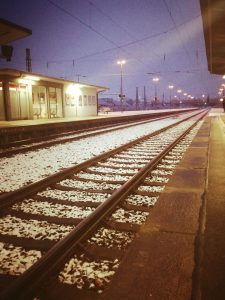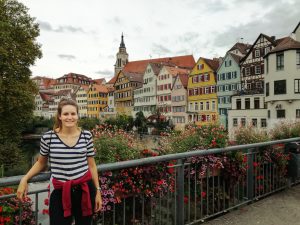In December 2017, which was the end of my third year of my bachelor’s degree program in Industrial Engineering, I started to conduct some research about Stellenbosch’s partner universities in Germany. My dream was to either complete my full masters at a German university or at least attend one semester. Throughout my research, I coincidentally stumbled across Reutlingen University. This university works in close collaboration with the Industrial Engineering department, offering a relatively unique opportunity for the master’s students: a double degree program. The Digital Industrial Management and Engineering master’s program is an exchange program where students have the opportunity to attend three semesters at their home university and one semester as an exchange student at the host university (German students would come to University Stellenbosch and the South African students would go to Reutlingen University). In my view, this was a WIN-WIN situation, as I would be able to commence an exchange semester, while also receiving an additional master’s degree from a European university as well as one from Stellenbosch.

Pre-departure
Fortunately, I have a European Passport, which spared me from the tedious Visa application process. Since I am also an international student at Stellenbosch, I was relatively well prepared regarding the application and registration process in a foreign country. With help from our German study coordinator from Reutlingen, the application process was relatively simple. He also put us South Africans in contact with the Reutlingen International Office (RIO), who contacted us regarding the accommodation. We were lucky enough to apply for the student dormitories, situated directly on the campus grounds.
Once I was accepted, I started conducting my research about the university. One disadvantage was that the program we enrolled for is a very small degree program, and therefore only limited information could be found on the university website. However, the German study coordinator was very helpful and helped a lot with all the arrangements in Germany. He also informed me about all the different documents I need for the registration process at the university at the beginning of the Semester. Surprisingly enough, even though Germany is a first world country, no documents are accepted in a digital format, only as a hard copy. Luckily, throughout my past five years at University Stellenbosch, I have found it to be very useful to keep a digital backup of all documents, but also a file containing all the hard copies of all the documents that might be required by the university. Through this, I was able to handle all unplanned and unforeseen situations successfully and seamlessly.
The admin part aside – now the actual travel arrangements had to be done. Since I was not entirely sure when my semester in Germany would start nor end, I only booked a one-way ticket to Germany. I was lucky, and for me, it worked out relatively well regarding the pricing and time, but I would recommend to all the future exchange students to rather book a return ticket and also do it far in advance as it will, most likely, turn out cheaper. It now seems like a girly thing to say – but packing turned out to be rather challenging. One piece of advice – don’t bother to pack too much of your South African wardrobe – you won’t be able to use them. Rather buy a nice winter jacket and a pair of boots in Germany, as they are geared for such temperature drops.
Experience at the Host University:
As I mentioned earlier, I am an international student at Stellenbosch as well, so I am used to being far away from home. Therefore, the far distance from home did not bother me at all. An additional advantage was that I also speak German fluently, so I did not experience any language barriers at all. When I arrived in Reutlingen for the first time, thanks to google maps, I found the university very easily, without experiencing any problems. I have arranged a meeting with the study coordinator in advance, who assisted me with the registration process as well as the key collections for the dormitories. He showed me around the campus and also informed me about the different courses I will need to attend in order to meet the prerequisites of the program.
Stating with the accommodation, I lived in a relatively new and modern building, directly on campus. I shared a kitchen and two bathrooms with five other international students, two of them being the other South Africans attending the same course as me in Reutlingen. We did a lot of different activities together, such as hiking, visiting different Christmas markets, or attending various events organized for the international students. The university did not only offer events for international students, but also for the local students to join. This made it very easy to meet new people.
The academic courses that I attended were mainly focused on the new topic Industry 4.0 – digitisation, digitalisation, and digital transformation. The classes were relatively small, ranging from five to twelve people per session. Because I was enrolled in a double degree program, I was put in contact with one of the German professors, who became the co-supervisor of my master’s thesis. He assisted me with my research project. The courses were very interesting and informative as the subject matter is directly related to my research topic.
As expected, because of the exceptionally well-functioning public transport system, traveling has been made very easy. I have purchased the Naldo semester ticket, which is a ticket you purchase once-off and can travel throughout the surrounding areas without additional costs. For longer distances, I would recommend Flixbus or BlaBlaCar. Reutlingen has the advantage that it is situated relatively convenient – Stuttgart and Heidelberg are very close, and Munich is not too far away either. Furthermore, Switzerland, as well as Austria, are also travel destinations, I would recommend to everyone, especially if you would like to have the full winter wonderland experience. There are a few shops and pubs to visit in Tübingen, which is only 10 minutes by train and has a great nightlife. It reminded me a lot about Stellenbosch, as it is also a rather smaller city and very student oriented as the whole city mainly consists out of the university.

Return to Stellenbosch:
Once I came back to South Africa, I had to make use of my car again in order to get somewhere further away. The accessibility of long-distance locations is definitely made so much easier in Germany with public transport. However, I have missed our beautiful Stellenbosch, the fact that all shops and clubs are within walking distance away from the university and my flat, my friends, our campus and also the beautiful Winelands and mountains. I am grateful that I had the opportunity to go to a foreign country, meet new friends, widen my network, and also experience some kind of personal growth as well. I have learned to be more open towards meeting new people and also not being too shy to ask for help if needed.

